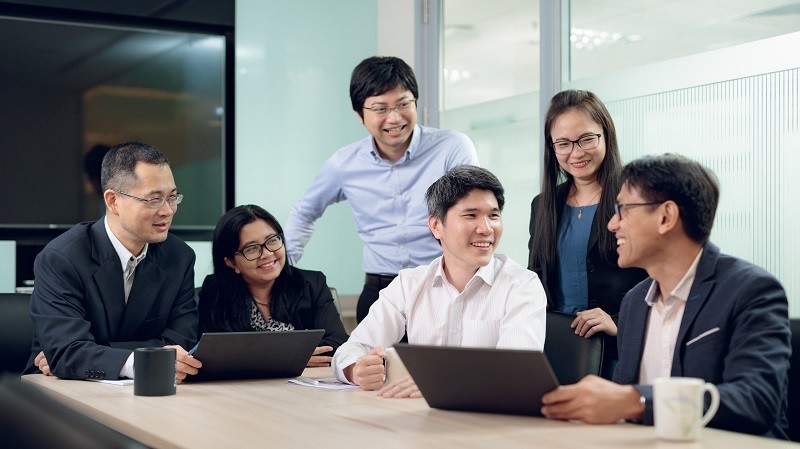By Mya Hnin Wai Pwint, Phatsaphone Phandanouvong

AMRO secondees, Ms Mya Hnin Wai Pwint (second from left) and Ms Phatsaphone Phandanouvong (fifth from left), discuss country surveillance with AMRO colleagues.
To improve and bolster macroeconomic surveillance capacities of its members, under the Technical Assistance Program, the ASEAN+3 Macroeconomic Research Office (AMRO) has hosted a number of secondees from its members through the Secondment Program. Secondees have been provided with on-the-job training opportunities at the AMRO office in Singapore as well as during AMRO’s Annual Consultation Visits to the member economies.
We speak to several secondees who just completed their one-year terms with AMRO about their experience in working and living in Singapore. They also share some useful tips with secondees who will join AMRO in the future.
In this article, Ms Mya Hnin Wai Pwint, Deputy Director of the Internal and International Relations and Information Department, Ministry of Planning and Finance of Myanmar, and Ms Phatsaphone Phandanouvong, Official of the External Finance and Debt Management Department, Ministry of Finance of Lao PDR, talk about what they learned in one year with AMRO.
Tell us briefly about your work and responsibilities at AMRO.
Mya Hnin Wai Pwint: My primary responsibilities at AMRO were to monitor and track news and updates on Myanmar’s economy, facilitate communication with the authorities especially for AMRO’s missions to Myanmar. I also supported the collection of data and analyses of Myanmar’s law and regulation and contribute to research on particular topics relevant to country surveillance works.
Phatsaphone Phandanouvong: Before being seconded to AMRO, my main duty at the Ministry of Finance of Lao PDR was coordination with external parties. So, when being assigned to the surveillance team at AMRO, I was exposed to a new and fresh area. It was challenging yet exciting to learn macroeconomic surveillance. I supported the surveillance team with a focus on Lao economy, such as data collection on the structure of the economy and foreign direct investment, coordination with authorities, collection of regulations and data requested by group heads and economists. I also contributed to a study on “Legislation and Public Finance Management Reform in Lao PDR.” I was also involved in the translation of the flagship report, the ASEAN+3 Regional Economic Outlook (AREO) 2018, into Lao. I also conducted the research paper on measuring and analyzing fiscal impulse in Lao PDR and exploring fiscal rules on mining revenue.
What are the top three takeaways from your time working with AMRO? How will you apply what you have learned at AMRO to your work at your home institutions?
Pwint: Through the work at AMRO, I was able to strengthen my critical thinking, enhance my research capacity as well as sharpen my communication skills and time management. At AMRO, I learned how to analyze the country economy, and how to evaluate country development with the focus on policy implementation. The supervisors, group heads and country economists whom I have worked with are very supportive, and I was benefited from their constructive feedback, which I highly appreciate. Now, I have gained a better understanding of assessments of risks and vulnerabilities, provision of relevant policy recommendations, and analyses on country economic growth. I am confident to say that I will be able to apply what I have acquired from AMRO to my current job as well as my future assignments at the Ministry of Planning and Finance.
Phandanouvong: During the Secondment Program, I leant many things, from macroeconomic surveillance to management of workflows. I have gained new knowledge and skills, especially on understanding and assessing fiscal policies as well as assessing an economy from various sectors. Besides, I was impressed by AMRO’s working procedure, which can also be applied to my work at my office in Lao PDR to help me improve work efficiency.
What will you miss the most about AMRO and Singapore?
Pwint: Effective coordination and timely feedback to help each other are the best practice that I will miss about AMRO. On a lighter note, I will truly miss our weekly “ASEAN+3 sharing lunch” when AMRO colleagues and I brought our own cuisines and exchanged the taste of authentic food from countries around the region.
I also enjoyed living in Singapore, one of the safest and cleanest countries in the world. Access to 24/7 restaurants, good public transport system, clean public space with many dustbins, toilets and street signs are what I like the most in Singapore.
Phandanouvong: I am grateful for the support and friendship from colleagues at AMRO. Moreover, to live in Singapore was very convenient and safe and I felt comfortable wherever I go.
What is your advice for the secondees who will join AMRO in the future to get prepared for working and leaving here?
Pwint: I think future secondees should prepare themselves with knowledge about economic issues of their own countries and equip with the analytical skills on country surveillances process. At the beginning of the Secondment Program, AMRO should provide orientation for all secondees. Moreover, AMRO may consider offering more training courses to secondees during their terms.
Phandanouvong: I think working at AMRO is quite challenging and colleagues here work very hard. Because each secondee has a different background in economics, so it would be great if AMRO could provide an orientation to brief them about the structure, the work procedure, and essential working guidelines. However, the coming secondees should not worry too much because when you come here, you are expected to learn and experience new things that might be different from your current work in your home offices. Group heads, as well as other colleagues at AMRO, are very supportive. They will provide suggestion and explanation on what you do not understand. Just get ready for the work at AMRO!
